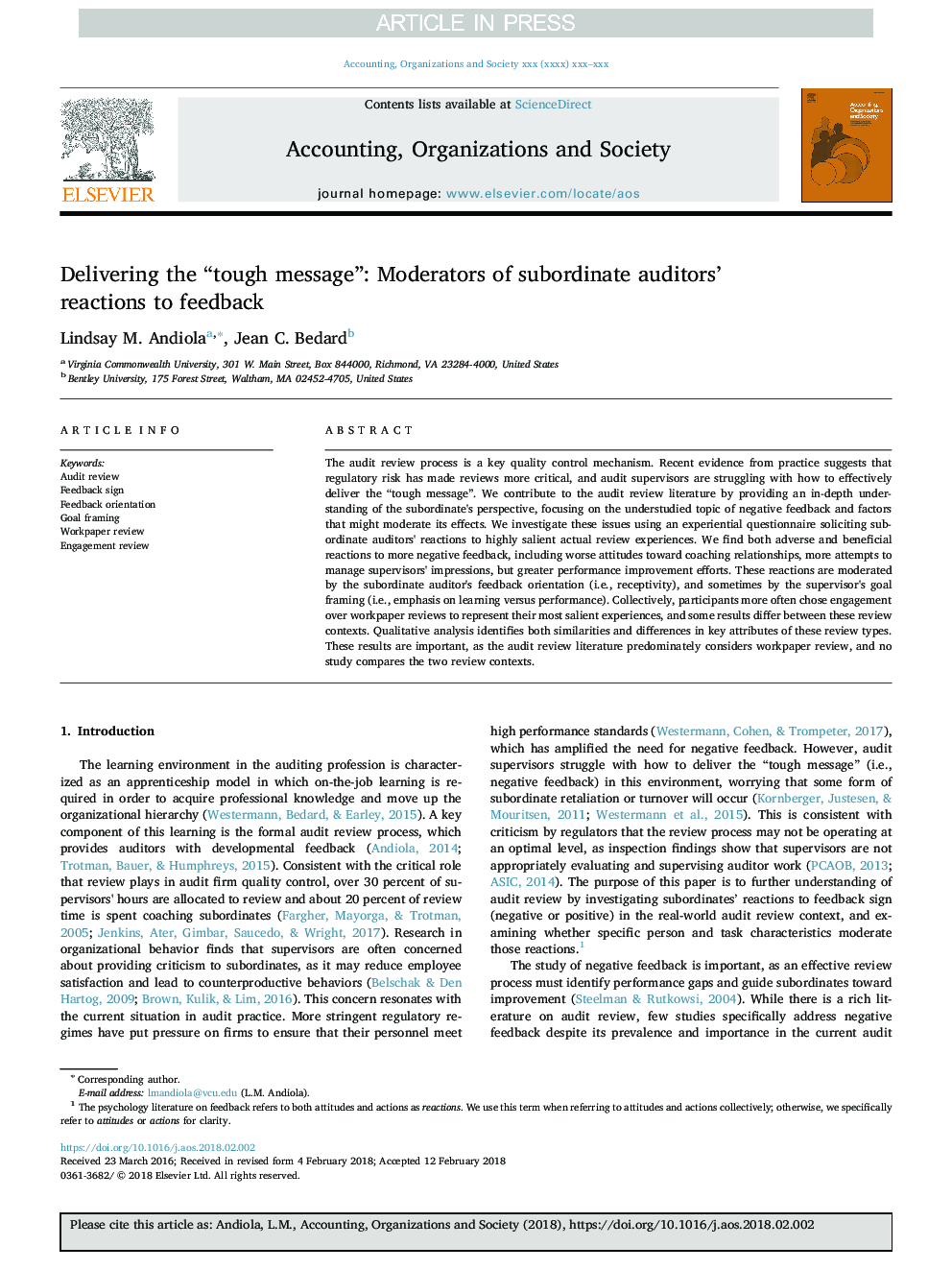| کد مقاله | کد نشریه | سال انتشار | مقاله انگلیسی | نسخه تمام متن |
|---|---|---|---|---|
| 11020640 | 1715778 | 2018 | 17 صفحه PDF | دانلود رایگان |
عنوان انگلیسی مقاله ISI
Delivering the “tough message”: Moderators of subordinate auditors' reactions to feedback
ترجمه فارسی عنوان
ارائه "پیام جدی": واکنش های مدیران متقاضیان حسابرسی به بازخورد
دانلود مقاله + سفارش ترجمه
دانلود مقاله ISI انگلیسی
رایگان برای ایرانیان
کلمات کلیدی
بررسی حسابرسی؛ نشانه بازخورد؛ جهت گیری بازخورد؛ فریم هدف؛ بررسی کاراکتر؛ بررسی تعامل
ترجمه چکیده
فرایند بررسی حسابرسی یک مکانیسم کنترل کیفیت کلیدی است. شواهد اخیر از عمل نشان می دهد که خطر نظارتی، انتقادات را بسیار حیاتی کرده است و سرپرستان حسابرسی با چگونگی ارائه پیام سختی مواجه هستند. ما در ادبیات بازنگری حسابرسی با ارائه درک عمیق از دیدگاه زیردستان، با تمرکز بر موضوع تفسیر بازخورد منفی و عوامل که می تواند اثرات آن را کاهش دهد، کمک می کنیم. ما این مسائل را با استفاده از یک پرسشنامه تجربی مورد بررسی قرار می دهیم که واکنش های حسابرسان وابسته به تجربیات واقعی بررسی واقعی را برجسته می کند. ما هر دو واکنش نامطلوب و مفید را به بازخورد منفی بیشتر، از جمله نگرش بدتر نسبت به روابط مربیگری، تلاش بیشتر برای مدیریت تصورات ناظران، اما تلاش های بهبود عملکرد بیشتر می یابیم. این واکنشها توسط گرایش بازخورد حسابرس زیر (یعنی پذیرش) و گاهی اوقات توسط فریم هدف سرپرست (یعنی تأکید بر یادگیری در مقابل عملکرد) تعدیل شده است. به طور خلاصه، شرکت کنندگان اغلب تصمیم گرفتند تا تجربیات تجربی را برای تجربیات برجسته خود درگیر کنند و برخی از نتایج بین این زمینه های بررسی متفاوت است. تجزیه و تحلیل کیفی هر دو شباهت و تفاوت در ویژگی های کلیدی این نوع بررسی ها را مشخص می کند. این نتایج بسیار مهم است، زیرا ادبیات بازنگری حسابرسی عمدتا بررسی مقاله کار را بررسی می کند و هیچ مطالعهای دو زمینه بررسی را مقایسه نمی کند.
موضوعات مرتبط
علوم انسانی و اجتماعی
مدیریت، کسب و کار و حسابداری
حسابداری
چکیده انگلیسی
The audit review process is a key quality control mechanism. Recent evidence from practice suggests that regulatory risk has made reviews more critical, and audit supervisors are struggling with how to effectively deliver the “tough message”. We contribute to the audit review literature by providing an in-depth understanding of the subordinate's perspective, focusing on the understudied topic of negative feedback and factors that might moderate its effects. We investigate these issues using an experiential questionnaire soliciting subordinate auditors' reactions to highly salient actual review experiences. We find both adverse and beneficial reactions to more negative feedback, including worse attitudes toward coaching relationships, more attempts to manage supervisors' impressions, but greater performance improvement efforts. These reactions are moderated by the subordinate auditor's feedback orientation (i.e., receptivity), and sometimes by the supervisor's goal framing (i.e., emphasis on learning versus performance). Collectively, participants more often chose engagement over workpaper reviews to represent their most salient experiences, and some results differ between these review contexts. Qualitative analysis identifies both similarities and differences in key attributes of these review types. These results are important, as the audit review literature predominately considers workpaper review, and no study compares the two review contexts.
ناشر
Database: Elsevier - ScienceDirect (ساینس دایرکت)
Journal: Accounting, Organizations and Society - Volume 70, October 2018, Pages 52-68
Journal: Accounting, Organizations and Society - Volume 70, October 2018, Pages 52-68
نویسندگان
Lindsay M. Andiola, Jean C. Bedard,
